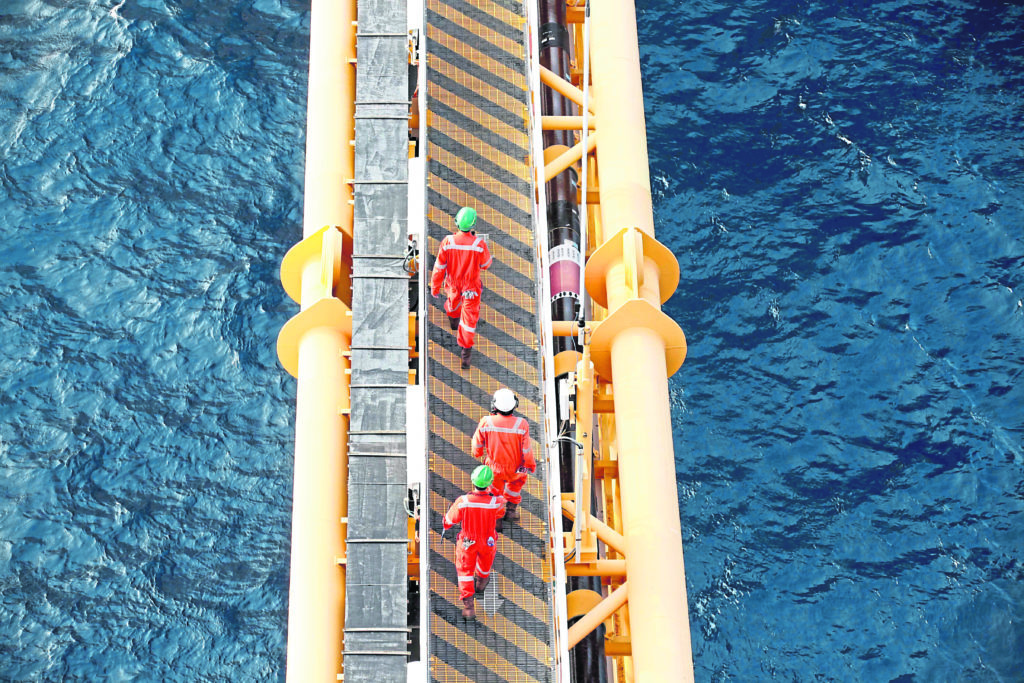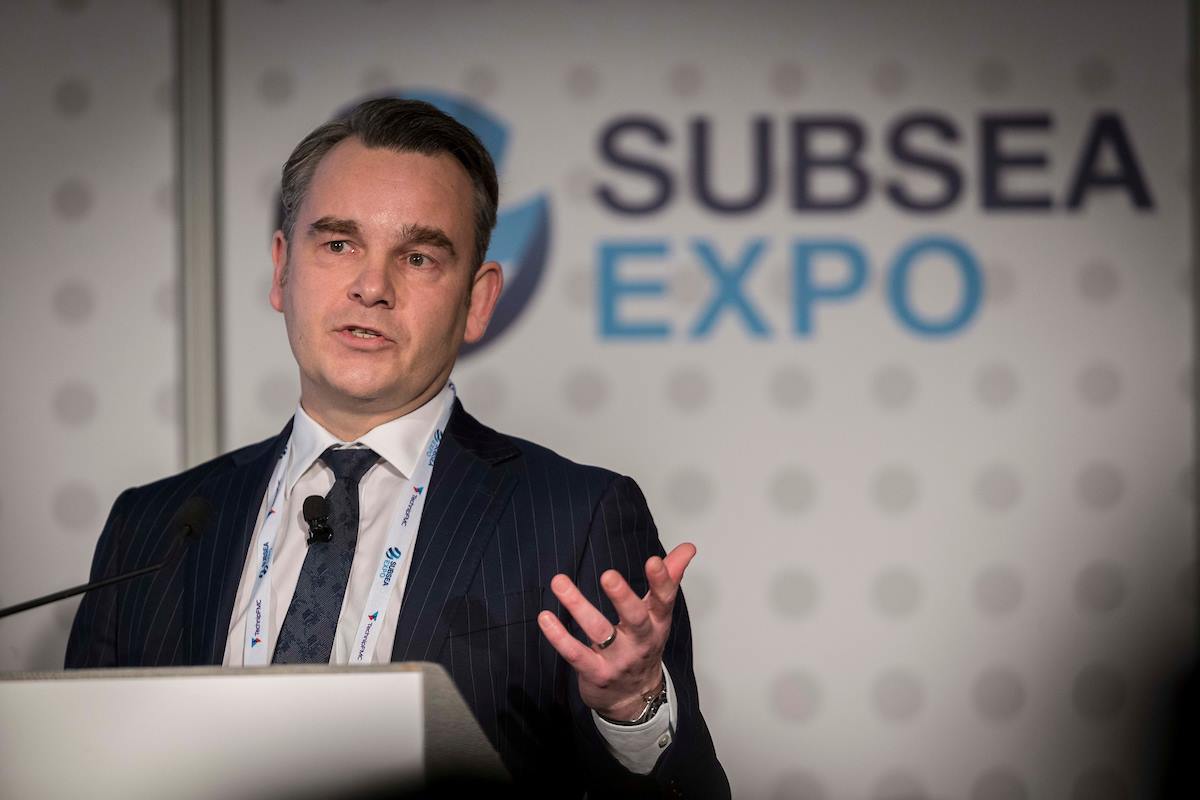 © BLACK GOLD
© BLACK GOLD The UK oil and gas industry has cut a fairly laidback figure amid the hullabaloo of Brexit.
There seems to be an acceptance – or sense of resignation – that the sector is simply “along for the ride”, and will wait for an outcome before making concrete plans.
But whatever shape Brexit takes, the overriding feeling is that the UK oil and gas industry is sophisticated and global enough in its approach to clear most hurdles without too much fuss.
During the launch of EY’s annual report on the UK oilfield services (OFS) sector last month, just 4% out of 110 attendees taking part in a live poll said Brexit was the biggest barrier to growth.
Industry behaviour and culture was the worst offender, with 39% of the vote.
It’s not a conclusive result, but it does chime with a lot of the conversations being had in Aberdeen.
At the same event, Paul de Leeuw, director of the Oil and Gas Institute at Robert Gordon University, said the sector knows how to overcome “complications” and is less exposed to Brexit than food and drink and automotive.
But Mr de Leeuw was concerned by the potential for the provision of goods and services to be disrupted, and called for London and Brussels to provide clarity “pretty darn pronto”.
Industry body Oil and Gas UK (OGUK) has stressed a “deal outcome” is in the “best interests” of the sector.
Andrew Reid, chief executive of research and consultancy firm Westwood Global Energy Group, agreed that the UK oil and gas industry’s global reach meant it was equipped to deal with most political and economic challenges.
“The day-to-day operations of a global oil and gas business are quite complex and challenging, so Brexit does not scare oil and gas as much as other industries,” Mr Reid said.
“Our clients say they are aware and will see what happens, but are not that concerned. They do not believe Brexit will have a material impact. Of course, there are some things they need to plan and manage but, ultimately, there is no great fear or threat.
“Of course, there is an impact regarding uncertainty. No one likes uncertainty.”
Unsurprisingly, some companies are more prepared than others.
Shane Taylor, research and policy manager at Aberdeen and Grampian Chamber of Commerce, said: “We still think that business is not broadly prepared for no-deal in its current state.
“What we definitely have seen is a lot more firms coming to us and asking for specific guidance on certain issues.
“Our latest Oil and Gas Survey in November showed around half had done some sort of risk assessment and preparation for Brexit.”
The main issues for the oil and gas sector relate to the free movement of labour, the trading of goods and products, and the reshaping of schemes for reducing carbon emissions from industry.
In mid-2017 OGUK said 5% of oil and gas workers in the UK were EU nationals and 5% are non-EU citizens. The rest are from the UK.
If a deal is struck, the free movement of people will continue until December 31 2020, when the transition period ends, after which a new immigration system will be needed.
Prime Minister Theresa May wants to apply minimum income thresholds to EU and non-EU immigrants equally, but failed to get approval for her preferred £30,000 level amid fears it would prove too restrictive to public sector recruitment.
The threshold should not hinder the recruitment plans of the UK oilfield services sector, where the average salary is around £50,000, according to EY’s report.
But Brexit could add extra layers of bureaucratic “pain” which EU nationals previously avoided.
Non-EU citizens are already used to jumping through hoops and meeting pay thresholds to get UK visas.
Brexit may actually present an opportunity to reform the non-EU immigration system, which could be beneficial.
Mr Reid said oil workers were highly skilled and that he did not “foresee an issue with movement of labour”. “In terms of additional bureaucracy, people will need to plan better, but it’s not an inhibitor,” he said.
The fate of agency workers employed in the UK on short-term contracts is unclear, however.
Questions about Brexit’s impact on the timely and commercial trade of products and equipment also remain.
In May 2017 OGUK said £61 billion worth of oil and gas trade between the UK and the rest of the world related to goods which may be subject to tariffs. The total “cost of trade” was about £600m per annum.
In a worst-case scenario, where the UK reverted to World Trade Organisation (WTO) rules with the EU and the rest of the world, the likely cost of trade would almost double to around £1.1bn per annum.
But if the UK could negotiate minimal tariffs with the EU and improve tariffs with the rest of the world, costs could fall by £100m per annum to £500m.
Alex Kemp, professor of petroleum economics at Aberdeen University, said duties being placed on equipment and parts could affect North Sea operations, but much depends on arrangements which have yet to be made, whether that means the adoption of WTO tariffs or otherwise.
But, playing down fears, Prof Kemp said: “Whatever the legal arrangements are on imports, because oil companies are very international in reach and knowledge, there should be resources available to minimise the impact.”
Parts of the UK supply chain are concerned about delays at Dover and Calais, and there have been reports of North Sea operators stockpiling critical kit.
If stockpiling is happening, there’s no evidence that it is widespread.
Mr Reid said: “We’re not seeing stockpiling of any particular goods.
“Within the oil sector, most of the items are unique anyway, so companies have to be ahead of the curve for placing orders.
“It’s complex and takes a bit of time and management to keep things turning.”
In any case, Mr Reid said the UK’s movement of oilfield equipment was linked more closely to the US and Asia than with the rest of the EU, with the exception of “pockets of equipment manufacture” in the Netherlands and Italy.
Commentators agree that the opportunity to redraw Free Trade Agreements with non-EU countries could be lucrative for the UK oil industry.
For example, in the case of decommissioning exports, the UK would mostly be targeting regions outside the EU.
Mr Reid said: “That’s the crux of the Brexit debate. The UK is no longer constrained by its position in Europe.
“There is uncertainty and everyone hates that, but you can create FTAs to add value to certain parts of UK economy, and that’s not just in oil and gas.
“So it’s not a one-sided argument, there are still opportunities. But until those agreements are nailed down, it’s uncertainty.”
So uncertainty abounds, but some outcomes are reasonably clear.
The EU’s emissions trading system (ETS) limits the level of greenhouse gases that can be emitted from installations, including North Sea oil platforms.
Within the cap, companies can buy emissions allowances at auction, each giving the holder the right to emit one tonne of carbon dioxide. If there is a deal, the UK would stay in the ETS until the transition period lapses, after which, there is a good chance the UK will introduce its own ETS linked to the EU scheme.
In a “no-deal” scenario, the UK will be excluded from the ETS automatically.
If that happens, the UK Government will introduce a tax of £16 per tonne of carbon
dioxide emitted.
In short, the UK has signalled its commitment to international climate change efforts. The system it ends up with is unlikely to represent a dramatic shift from the current setup, though the price of EU carbon permits could be affected, as the UK is currently such a big buyer.
Brexit is also unlikely to disrupt Britain’s involvement in the EU’s internal energy market (IEM), which facilitates the harmonious and tariff-free trading of gas and electricity across Europe.
It is not in anyone’s interests to interfere with what has been a successful system, according to Prof Kemp.
He said: “My own view would be that attempts would be made by the EU and UK to ensure that uninterrupted free trade does take place with respect to gas and electricity.
“It would be quite a big surprise if problems were raised about trading arrangements, because it’s clearly to the advantage of the EU and UK to continue to have free trade in
electricity and gas. I cannot imagine there would be restrictions.”


